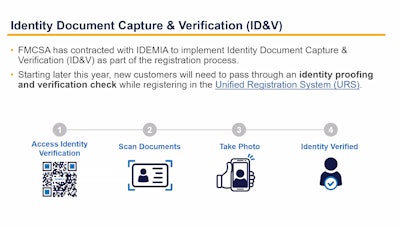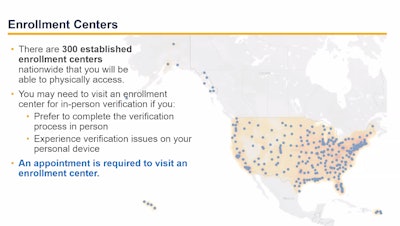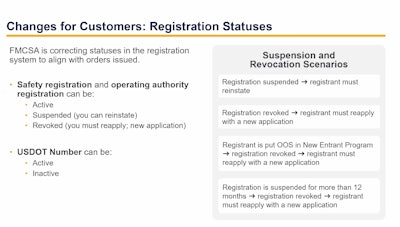The Federal Motor Carrier Safety Administration held another “stakeholder day” to get input from trucking industry professionals on its new registration system. It hopes new architecture and procedures will stem the rising tide of cargo theft and various forms of fraud in freight transactions.
Office of Registration Director Ken Riddle directly tied “fraud prevention” to the agency’s safety mission, acknowledging that maintenance takes a hit when legitimate carriers lose money to double brokers or get outright stiffed by identity thieves and others doing the double brokering.
“When this fraudulent activity takes money out of a carrier’s pocket, they then might not be able to afford new tires or new brakes or you name it,” said Riddle. “With a more secure system with some fraud-resistant features … I think that immediately impacts safety.”
The event featured a live demonstration of the new registration system in its current form. It features simplified menus and refers applicants to an ID-verification service through Idemia, the same company the Transportation Security Administration uses to screen passengers on commercial flights. The new steps and the verification tool share a focus on stopping bad actors from creating new FMCSA-regulated entities, but Riddle had other initiatives in mind as well.
“The industry is experiencing quite a bit of fraud coming from just about every corner, whether insurance, process agent, carrier, broker — all directions,” said Riddle. “We want to do our part at FMCSA to help mitigate the fraud.”
Riddle stressed that his office does not itself investigate or prosecute criminal activity. FMCSA as a whole has shied away from pursuing fraudulent carriers on perjury grounds or otherwise assessing civil penalties, for complicated administrative law reasons.
Overdrive reporting previously revealed a secondary “gray market” of sorts for MC numbers, where some carriers might get offered as much as $30,000 for an “aged MC” onboarded with big freight platforms like Amazon Relay and Uber Freight. FMCSA noted its own guidance on the right way to transfer an authority, yet on Monday Riddle made clear that too many are pursuing the wrong way to sell MCs. It’s driving up crime in the freight networks.
“We don’t regulate the asset sales,” FMCSA said of MC number sales, “but there is a right way to do it to record the sale with the right documentation, and in some cases that is not being done, which creates other problems.”
But whether MC numbers are sold or stolen via identity theft, “people are operating under false pretenses” said Riddle. One goal of the registration revamp is for FMCSA to “end [MC] transfers except for corporate mergers.”
[Related: How much is your MC# worth? Maybe as much as $30,000]
Speaking of identity theft, Riddle said FMCSA was “seeing a lot of phishing emails” and texts and encouraged people to check out FMCSA’s Registration Modernization Resources Hub to get trustworthy information on the system updates. Riddle again mentioned a new five-person registration fraud fighting team, keeping motor carrier and broker PIN numbers out of electronic communications (too often intercepted) and asking for a driver’s license before changing information on file with FMCSA as other mitigating steps.
Otherwise, the initial phase of registration modernization will be new-registrant facing, with ID verification representing the biggest change.
For a walkthrough of that process, Alex Vanjani from FMCSA’s IT department took attendees through the steps.

One of the first changes a user might notice takes the form of another security step. To log into the registration system, the applicant needs a “Login.gov” account, and when filing for authority, the system automatically imports the email address associated with that account.
The message is clear: The applicant must complete the process, and not on behalf of some other user. “Unlike today, the blanket company will not file on behalf of the applicant,” said Riddle. Following identity verification, the applicant can select the blanket company using an account number the blanket company will share with the applicant.
During the ID Verification step, applicants can file with a driver’s license, a passport, an ID card or a resident card. First, the applicant scans the document, both sides, and then is prompted to take a selfie and complete a “full facial scan,” said Vanjani. The information then gets processed in moments by Idemia, and only verified applicants proceed. All FMCSA staff stressed that neither the agency nor Idemia will retain identifying information of applicants.
[Related: Would-be FMCSA registration hackers claim to fight fraud with latest phishing expedition]
Applicants that can’t get the ID Verification working can visit an Idemia location. There are 300 currently contracted.

Vanjani emphasized that the system should be “user centric and easy to use” with a “very intuitive process” that takes the applicant down a checklist and gives them opportunities to review the inputs. Applicants are reminded during the process to use a valid Principal Place of Business (PPOB) and not a P.O. Box or other non-physical address. FMCSA has already begun denying applications with bad PPOBs, something fraud watchers have long advocated.
There’s opportunities to add DBAs and affiliations, something the pending “business verification” part of the process might make less manual. Applicants can add authorized users to the account as well.
Within a few minutes, Vanjani had completed the demo of the new registration process, and had set up an inactive USDOT number, as FMCSA intends to end docket “MC” numbers for motor carriers and freight forwarders. Vanjani and others stressed they want the system to work well on mobile, tablet and desktop and to work as seamlessly as streaming movies on Netflix.
The remaining steps, like adding business verification and auditing the registration of all entities in the agency’s system, will have to wait until 2025, and Riddle said he won’t set a firm date because it depends on when the system is ready. 
In addition to updating the registration system, Riddle said it would soon include what he called a new safety registry.
The agency had several more initiatives that would require a formal rule proposal process in the Federal Register and encouraged continued industry participation in the process of overhauling the system.
[Related: FMCSA to audit all authorities, hires registration fraud team]